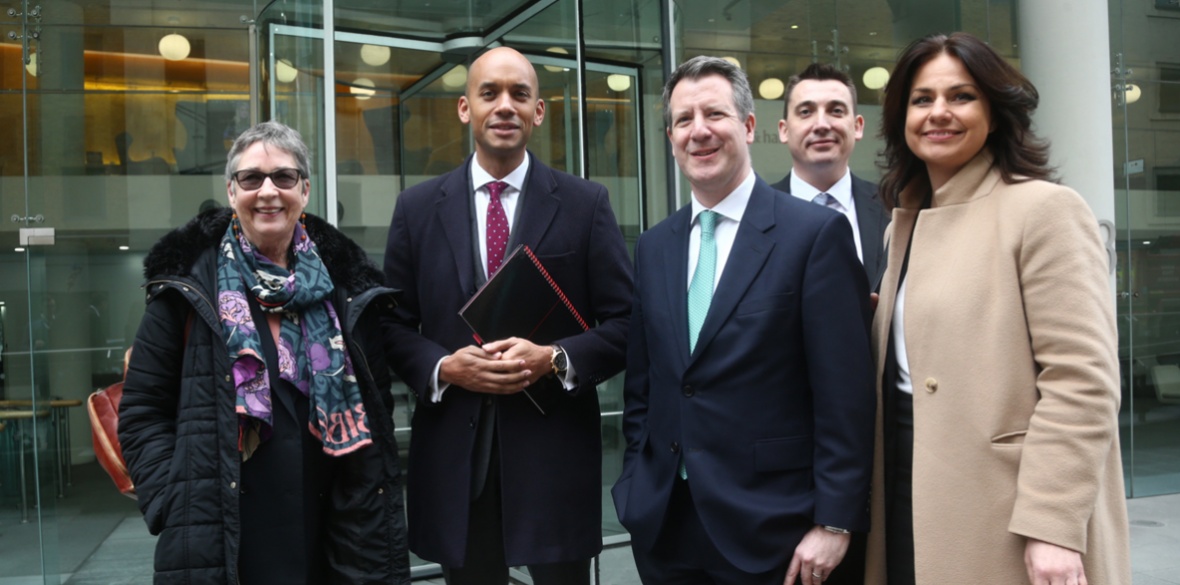This is the last article you can read this month
You can read more article this month
You can read more articles this month
Sorry your limit is up for this month
Reset on:
Please help support the Morning Star by subscribing here
WHATEVER happened to the unlikely lads? What became of the mould-breaking women?
When it launched, breakaway “centrist” party Change UK had incredibly good press. Newspaper pundits were impressed by Labour MPs like Chuka Umunna jumping ship to form a new party.
They called Change UK’s formation a “historic moment” and a political “tipping point.”
But when the new party first faced the voters, in the 2019 Euro elections, it failed to win a single seat.
The election revealed what the left already knew — Change UK were embarrassing amateurs, play-acting at politics.
Mainstream commentators taking them seriously showed that their conception of “sensible, centrist” politics was really very shallow.
Nice, smartly dressed people mouthing bland technocratic politics appealed to pundits because they saw people like themselves, but didn’t appeal to the electorate.
Since then, most centrist commentators have — perhaps in embarrassment — just stopped mentioning Change UK.
But we have a steady stream of revelations which show the party was not “breaking the mould,” it was produced by pushing some substandard material into a small replica of the mould.
The Intelligence and Security report shows that even many Conservative MPs are worried about Russian oligarchs buying friends in politics by donating to parties — at the same time as they buy friends in the City and the “hanger-on” worlds of PR, concierge, high-end estate agency and private security industries.
Taking money from wealthy Russians is almost entirely a Conservative Party game, so Change UK decided to imitate one of the least popular Tory tics.
Change UK managed to get its own rule-breaking payments from a Russian banker.
It accepted £4,100 in donations from Dmitry Leus. He was the director of various Moscow-based banks in the 2000s.
Leus then moved to Britain, where he runs his own investment firm, Imperium Investments.
The Independent Group had to return his donations because Leus is not actually registered to vote in Britain: Change UK tried to imitate Tory fundraising, but managed to make a mess of it, getting the scandal, but unable to keep the cash.
Change UK also spent money on Tories. In the run-up to the 2019 Euro elections it realised that being a top-down party with no grassroots didn’t actually work in elections.
So while it posed as a liberal, pro-EU group, it hired Boris Johnson’s old campaign team to build themselves up.
Change UK paid lobbying firm InHouse Communications to vet its candidates for the EU elections.
InHouse was founded by Jo Tanner and Katie Perrior, who ran Johnson’s 2008 mayoral campaign.
Being Johnson’s former PR team is central to InHouse business. Its publicity is heavily based on its Johnson connection, with quotes from him like: “They are the Fortnum and Mason of communications. They deliver, and they deliver quality. Without them, I simply would not have been made mayor.”
Hiring Tory campaigners to vet candidates had predictable results. Within days some of Change UK’s vetted candidates had to resign over offensive comments about black people and Romanians.
Change UK’s top team, having failed to win any seats in Parliament, are now shuffling off in a low-budget imitation of the way New Labour and Tory MPs grabbed corporate jobs.
The route from Westminster to boardroom was well established for Tories.
Blair’s gang, fresh from their rush of privatisation and deregulation, followed this career path.
So former Labour home secretary John Reid got a job with security giant G4S, Labour minister Gus McDonald joined Macquarie, the giant Australian bank that owned Thames Water.
Top Labour figures like Peter Mandelson and Tim Allan set up big consultancies and lobbying firms.
Change UK’s version are distinctly lower budget. In July Chris Leslie, former Labour MP and Change UK founder, became chief executive of the Credit Services Association (CSA) — “the voice of the UK debt collection industry.”
So Leslie is now the chief spokesman for bailiffs, debt collectors and the like. Leslie said he is “very much looking forward to my new role.”
Fellow Change UK founder Angela Smith was always close to the private water industry.
Even while a Labour MP, she attacked the party’s plans to renationalise water.
She has squeezed a small reward from her unpopular stand — she has now joined the board of Portsmouth Water, one of the smallest of the private water firms.
Meanwhile former Labour MPs and Change UK founders Chuka Umunna and Luciana Berger have both joined the same lobbying firm, Edelman.
Umunna is executive director in charge of Edelman’s “environmental, social, governance consultancy offer.”
Berger is “managing director of advocacy and public affairs” at Edelman UK, “specialising in health, food and drink, climate change and energy policy.”
Edelman’s current clients include Coca-Cola, several private water firms and privatiser Amey.
Edelman has been involved in some famous scandals, including setting up anti-union front groups for supermarket chain Walmart in the US, representing News International during phone hacking and “reputation laundering” for private prison firm Geo Group.
Change UK would be more accurately called “Don’t Change UK.” It was a failure in its own terms.
But by giving a bunch of the “liberal” media one more excuse to attack Labour as it moved leftward, it arguably had one success. Making sure Britain didn’t change its long-running Conservative government.











